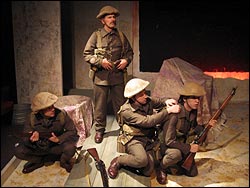The Accrington Pals is the nickname of a volunteer service battalion gathered from a small town in East Lancashire during the early months of the First World War. On the opening day of the infamous Battle of the Somme, July 1, 1916, the East Lancashire regiment, containing some 720 “Pals,” was virtually wiped out as the soldiers tried to advance into the barbed-wire hell of “No Man’s Land.” Fewer than 150 soldiers from the Accrington gang survived. Back home, their families were fed chipper propaganda about rousing victories and insignificant casualties, if they were given any news at all. As the truth began to trickle in, so grew the legend of the Accrington Pals: brave patriots sacrificed on the mantle of military necessity, gone but not forgotten.
The reasons for staging Peter Whelan’s The Accrington Pals (through Sunday, Nov. 27, at Exchange Theatre at Seattle Public Theatre; 425-254-0090, www.click4tix.com) at this time are clear, and can be summed up neatly in the symbol of a weather-beaten yellow ribbon stuck on the back of an SUV. What goes around comes around. The play itself, which centers on a pair of relationships between two volunteers and their womenfolk back home, is a slice of provincial melodrama, well built and often touching in its adherence to depicting the quotidian toll of war. Idealistic Tom (Jeremy Topping) sends pained letters home to his unrequited love May (Eva Doak), an older woman whose fastidiousness and emotional efficiency often make her a better businessperson than companion. Ralph (Paul Bergman) and Eva (Karly Smaciarz) are the embodiment of young love, carnal and carefree. As the wages of war, longing, and loss play out through these two couples, we see a spectrum of reactions to the individual’s collision with the devastating machinery of history. The appeal of this play is in the minutiae, the small details of everyday life that capture some essential aspect of the human spirit.
Unfortunately, it’s in the details that this production goes completely awry. First and foremost, there is the set. The backdrop, with its high beige-and-white smeared wall, looks more like a museum mock-up of ancient Greece than early 20th-century England—an impression unalleviated by a recruitment poster reproduced as a faded fresco. Even more troublesome is the placement of the play’s minimal pieces—a fruit cart, a bathtub, a table here and a chair there—which creates a sort of obstacle course for the actors. It would take a brilliant mind to route the action through this shin-barking mess, and perhaps director Vince Brady should be forgiven for his cubist approach to blocking. Nevertheless, the results are frustrating—significant swaths of dialogue are smudged by actors facing upstage for moments at a time, depriving the audience from fully appreciating the United Nations array of accents on display: everything from Cockney and high British to Irish, Monty Python–ese, and an amalgam of Southern Baptist and lowland Scots. On the other hand, it would be too much to ask the prop-wielding actors to follow suit and point that rifle away from the audience; we wouldn’t want to miss the point (blank). I’ve got four words for the decision to level a barrel six feet from my head: Post. Traumatic. Stress. Syndrome. The irony runs deep.
The saddest aspect of all this poor planning and shoddy execution is that a couple of very fine performances suffer collateral damage. As the scolding mother Annie, Ailsa Prideaux-Mooney’s grief-stricken breakdown in the final act nearly saves the play, it carries that much authentic emotional heft. And Deya Ozburn shines in her role of Sarah, a free spirit who seems imprisoned by small-town ways. It’s hardly the fault of the rest of the cast that their performances are obscured and stifled; they struggle mightily, but it’s just no use. This is the right play at the right time, but it lacks the pulse of passion, and that’s too bad.








